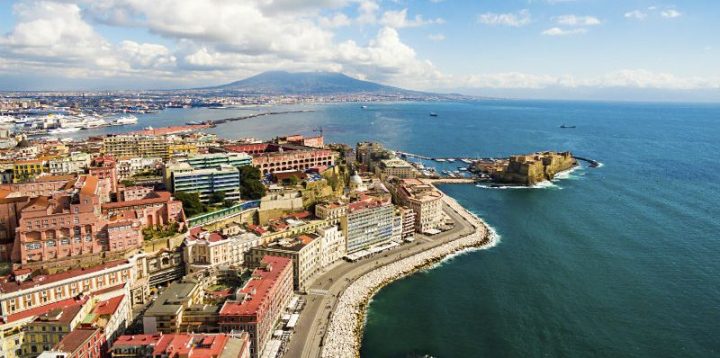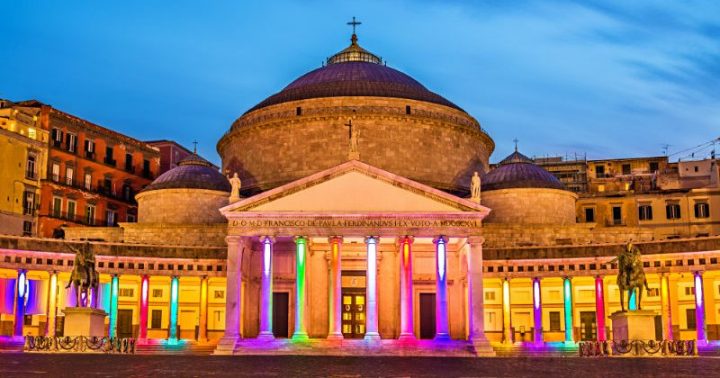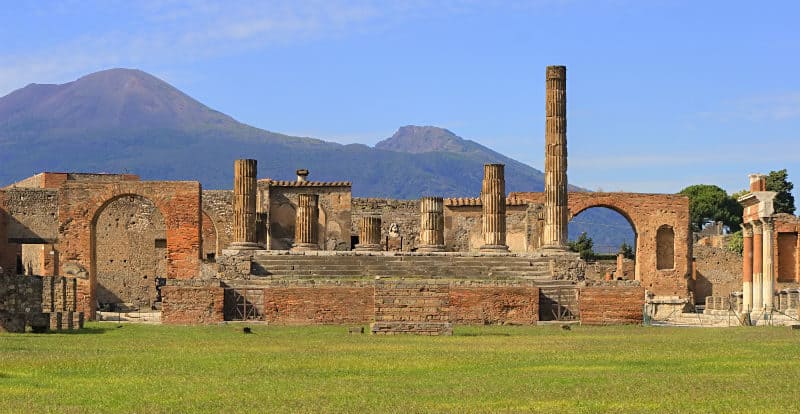
Gay Naples City Guide
First time in Naples? Then our gay Naples city guide page is for you

Naples | Napoli
Capital of the Campania region and Italy's third largest city, Naples is the centre of a metropolitan area of over 3 million people.
Situated on the Mediterranean coast and under the shadow of the active volcano Mt Vesuvius that was responsible for the devastation of Pompeii and Herculaneum. It was also heart of the Kingdom of Naples, a region with wide-ranging political and cultural influence.
Nowadays, Naples is known for its port, which is one of the most important in Italy. Despite having a gritty reputation, Naples offers beautiful architecture, fascinating museums, great shopping opportunities, fantastic food (Naples was the birthplace of pizza) and a modest gay scene.
Gay Rights in Italy
For information about gay rights in Italy, please see our Gay Rome City Guide page.
Gay Scene
In comparison to Milan and Rome, Naples' gay scene is relatively reserved. The gay scene here is modest to say the least, but you will be able to find Gay Bars, Gay Dance Clubs, Cruise Clubs and a Gay Sauna.
Despite the limited number of specifically gay venues, most bars and clubs are also popular with gay visitors. The city also hosts a popular pride celebration in June.
Getting to Naples
By plane
Naples International Airport (NAP) is located just under 4 miles north east of the city. It is well connected to destinations in Europe by both flag and budget carriers. It also offers connections to North Africa and also offers a seasonal transatlantic service.
A direct (Alibus) offers an easy connection to the city centre and costs €3 (€4 from the driver). Journeys take 15 minutes and it runs 6.30am to 11.50pm Monday to Friday and finishes at 11.39pm on Weekends and holidays. Bus 3S offers a slightly longer service but it is cheaper (€1.10).
Authorised taxis can be found just outside the airport. The journey time takes around 15 minutes and can cost between €12 to €20 depending on traffic and what time of day it is.
By boat
Naples is a popular destination for cruise ships and the Stazione Marittima is located in the city centre. There are overnight ferry connections to Sardinia, Sicily and Corsica as well as to Tunis.
By train
Naples is well connected to the rest of Italy by rail services from Napoli Centrale. Unlike other European cities, it does not offer international services.

Getting around Naples
On foot
The main sites of Naples are in a short walking distance of each other however navigating the bustling roads can be a task in itself. We advise following the locals when it comes to crossing the roads.
By public transport
Naples has a metro system but it is mostly for commuters. For €1.10 you can take a single journey on buses, trams, the metro and a funicular (€3.10 for day cards). Surprisingly most services are finished before 11pm with a few later services on weekends. Be aware that pickpockets operate across the network.
By taxi
Registered taxis are recognisable by their white cabs, city emblem displayed on their front doors and back licence plate, and by the presence of a meter. There are several set fares which must be displayed. Demand to see this before travelling and do not take the journey if they can't provide this.
By ferry
Naples is well connected to the islands of Capri and Ischia, amongst other locations like Amalfi, and these are well worth a day out by sea. Hydrofoils and other boats leave from Molo Beverello, Mergellina or Pozzuoli. Be aware the route to Capri can be quite rough.
Where to Stay in Naples
For some of the best hotel selections in Naples, visit our Gay Naples Hotels page.
Things to See and Do
Castelnuovo - huge medieval castle that hosts the city museum. It hosts an excellent collection of art and from the roof of the castle you will be treated to some of the best views Naples can offer.
Museo Archeologico Nazionale - this is the largest museum in the world that is dedicated to Roman architecture. It's notable for both the quality and the quantity of the objects exhibited here. Be sure to check out the "Secret Room" with it's ensemble of erotic objects from Pompeii.
Parco Virgiliano - about half an hour from the city centre but worth the journey due to the spectacular views it offers over Naples and the surrounding area.
Duomo - Naples most famous cathedral and one of the city's icons. It is known for housing the dried blood of St Januarius which is brought out twice a year to great ceremony.
Teatro San Carlo - famous opera house connected to the Royal Palace. This is your best bet for catching traditional Italian opera.
Pompeii - one of the most famous Roman sites in the world. Pompeii was destroyed when Mt Vesuvius erupted in AD 79 and covered the city with ash. Day trips are advertised in Naples city centre but you can travel there by your own steam.
Herculaneum - destroyed at the same time as Pompeii, Herculaneum is another great example of preserved Roman architecture. There are 5 site passes available for €20 which also allows you access to Pompeii and other sites.
Vesuvius - if you're feeling active you can climb Mt Vesuvius for spectacular views of the Bay of Naples. We advise taking plenty of water with you and wearing a good pair of walking shoes as you cannot take a taxi to the top. Also, due to it being an active volcano we advise checking local media before climbing.

When to Visit
For the best sightseeing opportunities, we would recommend visiting Naples in Spring when the weather isn't unbearable and the crowds aren't so heaving. Autumn and winter can be pleasant but rain is also just as common.
Naples has a pride festival in June but there are a number of festivals throughout the year of interest. We recommend Carnival in February, Holy Week in Easter and the pizza festival between June and July.
Safety
Violent crime is rare in Naples, and Italy in general, however Naples does have a reputation for pick-pocketing and scamming. As anywhere, we would advise you to just keep your wits about you and take the same precautions anywhere (look after valuables, avoid crowds, take registered taxis).
Money
Italy is a member of the euro zone. ATM's (bancomat) are widely available. Shops love cash. You will not be refused a discount in many independent stores if you pay cash. Most shops will ask for ID if you pay with a credit card.
Foreign exchange offices (cambio) are located close to all main tourist areas but generally offer poor rates of exchange.
Join the Travel Gay Newsletter
Have we got something wrong?
Are we missing a new venue or has a business closed? Or has something changed and we have not yet updated our pages? Please use this form to let us know. We really appreciate your feedback.